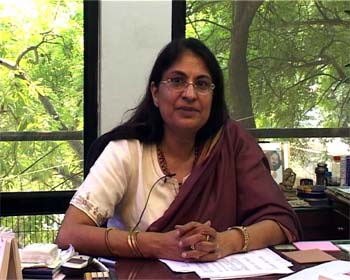Jan 07, 2026
Jan 07, 2026
by Neeta Lal
 At first, Rashmi Paliwal's garment factory and office in Gurgaon, Haryana, seems like any other. Full of hustle and bustle, chockfull of merchandise, a young woman in charge of its front office... But look closely and you realize how different the entrepreneur's staff is. The girl at the reception has cerebral palsy; the office boy - 30-year-old Sachin - is hearing-impaired.
At first, Rashmi Paliwal's garment factory and office in Gurgaon, Haryana, seems like any other. Full of hustle and bustle, chockfull of merchandise, a young woman in charge of its front office... But look closely and you realize how different the entrepreneur's staff is. The girl at the reception has cerebral palsy; the office boy - 30-year-old Sachin - is hearing-impaired.
Several others in Paliwal's unique workforce are visually handicapped, mentally or physically challenged or suffering from multiple disabilities. Move around the factory premises and you're amazed at differently-abled people adroitly going about their craft under a monitor's supervision. Some are putting tags on garments even as the others slip them into shiny cellophane packets. In the tailoring department, a few are expertly cutting up garments, while others are measuring them, stitching them, or sewing buttons onto them.
"I started out with just a handful of disabled people when I began my business in 1980," says Paliwal, 52, winner of the 1999 Hellen Keller award instituted by the National Centre for the Promotion of Employment for Disabled People (NCPEDP) and the Rajiv Gandhi Foundation. "But when I saw that a bit of training and encouragement could transform their lives - give them dignity and a source of livelihood - I got into it in full earnest."
Today, out of Paliwal's workforce of 400, there are 35 men and five women who are differently-abled. Under her project, Disha, she has trained over 200 people and found employment for many in different companies. Paliwal's special workforce has also produced uniforms for five schools in Delhi and put up street plays, apart from lending a helping hand at the office. "My dream is to run an entire factory with disabled people who can produce uniforms for schools, airlines, restaurants, malls..." says the entrepreneur who has a master's in textile designing from MS University, Baroda.
Paliwal also employs counsellors - three full-time and two part-time - at her factory to assist her workers with special needs. The counsellors occasionally even pitch in to advice the parents.
To further empower the differently-abled - and enhance their employability in the corporate sector - Paliwal also conducts sensitization workshops for exporters, and training workshops for those with special needs apart from networking with NGOs and academic institutes to lobby for their rights. She has also been involved with research projects on the disabled with IIT Delhi and Delhi University. "It's a pity that in a country of six million disabled people, we're doing so little to help them. We need to sensitize people more about this issue," she avers.
Paliwal - who exports clothing and furnishings to Europe and the US under the brand, 'Balloons' - employs a unique method to train the physically and mentally challenged. The person is first put in one of her numerous departments at the factory to gauge aptitude. If the first department works out well, s/he stays; otherwise, the person is shifted to another department and so on until the right match between the person's ability and the work is found. This adjustment or orientation may take anything from three to six months.
"We try and absorb as many people as feasible. Only in rare cases do we turn people away. The garment industry has so much scope for these people. That's why we've been able to place a lot of them with export companies," explains Paliwal.
But what about the handicapped person's productivity? "Well, I wouldn't say they are at par with others but they become proficient after training. The hearing-impaired of course can perform very well, as can those with a slight physical handicap. It's the visually and mentally challenged people who are a real challenge," she says.
However, Paliwal's efforts have yielded very encouraging results. The transformation in some people - after they have undergone training through Disha - is dramatic. She recounts the case of a 30-year-old mentally challenged youth who came to her. He was very violent and had recurrent fits of banging his head against the wall. But after counselling, the boy's condition improved enough for Paliwal to put him in the button-sorting department. A few months later, the boy became so confident that he started commuting unescorted to office. "The work, the dignity associated with a job, and encouragement - all worked like therapy for him," she says.
Recently, when Paliwal shifted her office from Humayun Nagar in south Delhi to Gurgaon, she was apprehensive that her prized workforce would find the long distance commuting tough. But she needn't have feared. For her workers seem to have adjusted quite well to their new environs. "In fact," laughs Paliwal, "when two of our boys - both suffering from a hearing disability - learnt that we were moving, they quickly gave up their rented apartments in south Delhi and were the first to hire a new apartment close to our factory!"
24-Apr-2005
More by : Neeta Lal

|
I have no words to describe a wonderful job being done by Ms Rashmi Paliwal. India needs such "Entrepreneurs with Empath". My best wishes to her. Hope other persons take a leaf out of her endeavour. |